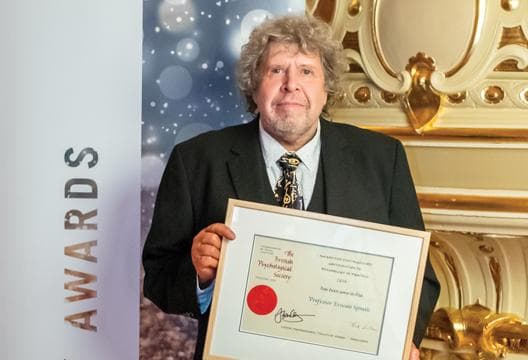
Award-winning contributions
Ella Rhodes on the latest round of British Psychological Society recognition.
04 April 2019
Share this page
Another year, another group of British Psychological Society award winners, all of whom have contributed enormously to psychology research, teaching and clinical practice. This year's winners include specialists in Clinical Psychology, advocates for offender rehabilitation, and the technicians who work too-often behind the scenes.
This year the Professional Practice Board (PPB) has named two winners of its Lifetime Achievement award – Professor of Clinical Psychology Philippa Garety (Kings College London) and Emeritus Professor of Clinical Psychology Mike Berger (Royal Holloway, University of London). Garety was instrumental in challenging the view of past decades that psychosis was not treatable through therapy. She has published around 200 peer-reviewed articles on the psychological processes of psychosis and interventions to help those who experience it. Cognitive Behavioural Therapy for Psychosis is now used across the globe.
Berger spent much of his career working with children and adolescents including work at the Maudsley Hospital, Bethlem Royal Hospital and St George's Hospital, specialising in helping young people with autism, communication and learning difficulties. He has also been involved with research on children with autism and their families, specialised in psychometrics used in clinical and neuropsychological assessment and had a special interest in the relevance of psychology to healthcare informatics (see p.3 and online).
The PPB also chose two winners in its Distinguished Contribution to Practice award: Health Psychologist Dr Vivien Swanson (University of Stirling) and Existential Psychotherapist Professor Ernesto Spinelli. Swanson is credited with delivering the only nationally-funded practitioner health psychology training programme in the world (NHS Education for Scotland). She was also instrumental in establishing health psychology undergraduate and postgraduate courses in Scotland and securing funding for trainees. Spinelli is an internationally-recognised leader in existential therapy and coaching psychology, and developed and taught the first psychology undergraduate and PhD programmes to focus on counselling and psychotherapy research. His latest book, Practising Existential Therapy: The Relational World, (2nd edition, 2015), was identified as the most influential contemporary text on existential therapeutic practice.
The PPB's Award for Innovation in Practice went to Forensic Psychologist Dr Geraldine O'Hare, Director of Rehabilitation with the Probation Board for Northern Ireland. After a Winston Churchill Fellowship allowed her to travel to the USA to learn about 'Problem Solving Courts', which attempt to tackle the underlying issues that can lead to criminal behaviour, she influenced the Department of Justice, Criminal Justice System and the Judiciary in Northern Ireland to introduce them in Northern Ireland. The country now has a number of these courts, including Substance Misuse Courts and Domestic Violence Courts, and is set to introduce the first Mental Health Problem Solving Court in Northern Ireland.
The Research Board has awarded the 2019 Spearman Medal to Dr Stephen Fleming, a Sir Henry Dale Wellcome Trust/Royal Society Fellow at the Wellcome Centre for Human Neuroimaging, who leads the MetaLab at University College London. His research explores the tricky questions of how the brain allows humans to engage in conscious, and reflective, thought. His recent articles include neuroimaging research on people's confidence in their decisions, changing minds on perceptual decisions, and the association between psychiatric symptoms and brain lesions on metacognition.
Dr Nadine Lavan (University College, London) who completed her PhD at Royal Holloway, University of London, has won the 2018 Award for Outstanding Doctoral Research. Lavan was nominated for two papers. The first, published in the Journal of Experimental Psychology, investigated the perception of voices from laughter and the pronunciation of vowels. The second, published in Psychonomic Bulletin and Review, was a call-to-action for researchers in the field to incorporate within-person variability into their work.
This year the BPS and Association for Technical Staff in Psychology (ATSiP) jointly made three awards to five technicians who work to support research psychologists in myriad ways. The individual award went to Sam Royle (University of Salford), who is the department's only technician, supporting more than 700 staff and students. The team award went to three technicians at Durham University: Elaine Stanton, Andrew Long and Simon Thurlbeck. Kristin Thompson, who worked at Bucks New University, won the Psychological Teaching Award.
Look out for interviews with and articles by the award winners in our pages over the coming months.


